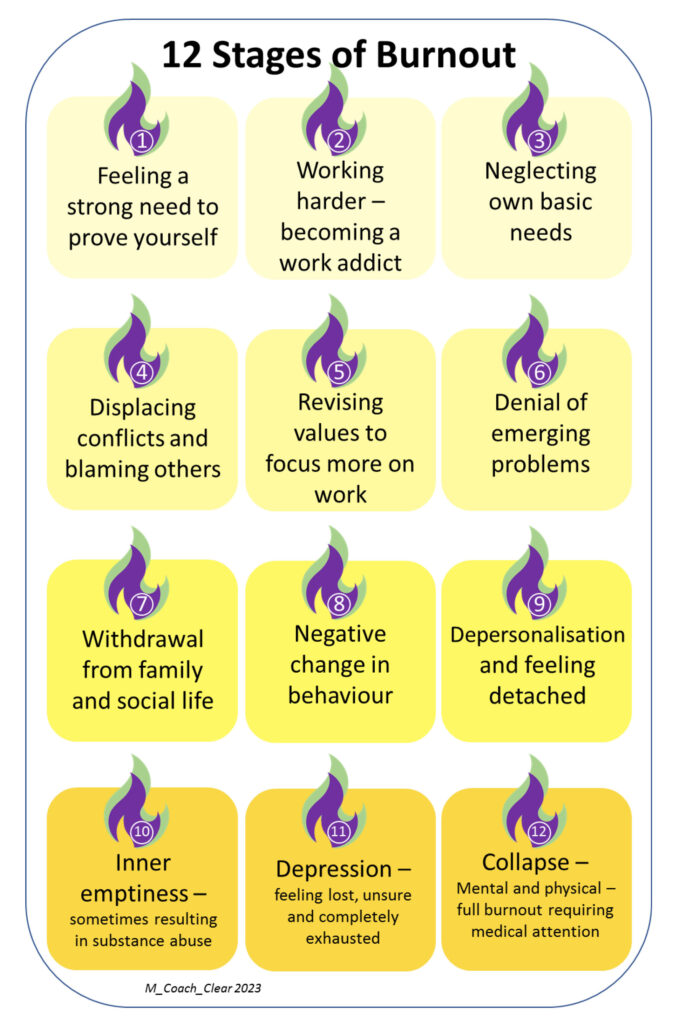Signs of Burnout
Learning to be aware of and then watching out for increased and over stress or more importantly the early signs of burnout are essential. To identify the progression from healthy levels of stress to total collapse, psychologists Herbert Freudenberger and Gail North developed the 12-stage model of burnout. It is worth noting that the stages do not always come sequentially and movement from one stage to the next can sometimes occur simultaneously.

The steps can be described as follows:
- Having ambition and the desire to prove yourself can turn compulsive with aims toward perfection which can build your stress levels, and if left unchecked can have negative impacts on your life.
- A natural follow on from step 1 is the drive to work harder. This demonstration of “irreplaceability” can result in a lack of willingness to delegate and being caught up in the feeling of being too busy, which can result in losing focus and making mistakes, and the inability to disengage from work.
- When we are so engrossed with work and an all-consuming schedule, looking after personal needs takes second place. This often starts with sleep problems and relationship neglect.
- The problems start to manifest in other ways, knowing something is not right but not being able to identify the source of the pain. The body starts to physically manifest symptoms here and tears “crying over spilt milk”, and anger “yelling at the kids” – are all signs that the internal conflict is being displaced.
- The perception that we are only as good as our performance at work is a common area of concern here. The values and boundaries of self-worth, family and sometimes ethics can get confused and out of focus.
- “Everyone else is out of step” is a concept that is adopted when the personal problem is being denied. When the problem is denied, it can fester and worsen.
- Acceptance that there is a problem is an essential stage of recovery, in any field.
- That feeling of being “too full” of stuff is common at this stage. Physically, it can feel like drowning, or suffocating. This stage can start to lead to depression and/or substance abuse (including over-eating). We can feel a withdrawal from reality, and this can lead to several other reckless and potentially dangerous situations and issues.
- This stage gathers the previous points and results or manifests in obvious behavioural issues. Clients often say things like – “that wasn’t me – I don’t normally act like that”. The feeling of watching a less well-behaved version of themselves taking over can be frightening (when they are still in a position to recognise it).
- I sometimes see this stage manifest early on in the process. There is a sense of becoming depersonalised and losing the feeling of self-worth in all aspects of life. I see this so often when I work with women.
- The stage of feeling inner emptiness quickly follows and goes hand-in-hand with depersonalisation, withdrawal and depression (See below).
- Depression, exhaustion, feeling lost and numb are frightening places to be. This can result in an inability to reach out for help oneself. Intervention is recommended, particularly if the lack of hope leads to negative, life impacting thoughts.
- This final stage is where full medical and psychological intervention is required. It is manifested in total physical or mental breakdown
Life-changing coaching practices use powerful positive affirmation and future goal setting tools to help individuals find themselves and find purpose in their lives.
Taking control of our lives helps take away the risk of spilt milk ruining our day!




